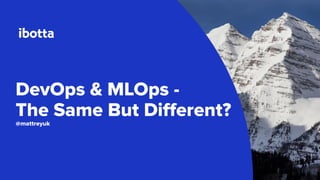DevOps Days Rockies MLOps
- 1. DevOps & MLOps - The Same But Different? @mattreyuk
- 2. Agenda 2 ● What is machine learning ● What’s the same as regular service development ● What’s different (and can go wrong) ● Building ML teams and their place in the company ● How we do ML at Ibotta ● The future
- 3. Background 3 ● I'm Matt Reynolds, a principal platform engineer on the machine learning team at Ibotta ● Ibotta is a rewarded shopping company with mobile, web and white label platform components ● Based here in Denver but now fully "remote-friendly" ● We're hiring - https://home.ibotta.com/work-with-us/careers/
- 4. What Is ML? 4 Machine learning (ML) A program or system that builds (trains) a predictive model from input data. The system uses the learned model to make useful predictions from new (never-before-seen) data drawn from the same distribution as the one used to train the model. https://developers.google.com/machine-learning/glossary#machine-learning
- 5. Types Of ML 5 ● “Analytical” ML One off, exploratory, findings used in reports to management ● “Engineering” ML Models deployed to production, called by services
- 6. What’s The Same For ML? 6 ● Frameworks/libraries/tools ● Git/PRs for code ● CI/CD - process automation for repeatability ● Provide a service in production ● Service monitoring*
- 7. Some Companies Struggle… 7 55% of companies surveyed did not have a model in production https://info.algorithmia.com/hubfs/2019/Whitepapers/The-State-of-Enterprise-ML-2020/Algo rithmia_2020_State_of_Enterprise_ML.pdf 87% of data science projects don’t make it to production https://venturebeat.com/2019/07/19/why-do-87-of-data-science-projects-never-make-it-into -production/
- 10. Exploratory Data Analysis (EDA) 10 New Models require: ● Finding data sources that may be suitable ● Checking Data Quality, distribution ● Figuring out label generation ● Building initial Features ● Testing with algorithm(s) ● Validating results and tuning
- 11. What’s Different? 11 ● DATA ● People
- 12. People 12 “Data Scientists” have different skill sets: ● Have their own jargon ● May not be used to writing “production ready” code ● May not be used to being on-call, production support ● Mostly work in Python
- 13. What’s Different? 13 ● DATA ● People ● Different tools
- 14. Different Tools 14 As well as the tooling to run a “regular” service, you also need: ● Data pipeline ● Feature engineering ● Feature store ● Training & hyperparameter tuning infrastructure ● Maybe specialized inference hardware (GPU) ● Inference monitoring (data drift)
- 15. Jupyter Notebooks 15 https://jupyter.org/try-jupyter/retro/notebooks/?path=notebooks/Intro.ipynb
- 16. Jupyter Notebooks 16 https://jupyter.org/try-jupyter/retro/notebooks/?path=notebooks/Intro.ipynb { "cell_type": "code", "source": "from matplotlib import pyplot as pltnimport numpy as npnn# Generate 100 random data points along 3 dimensionsnx, y, scale = np.random.randn(3, 100)nfig, ax = plt.subplots()nn# Map each onto a scatterplot we'll create with Matplotlibnax.scatter(x=x, y=y, c=scale, s=np.abs(scale)*500)nax.set(title="Some random data, created with JupyterLab!")nplt.show()", "metadata": { "trusted": true }, "execution_count": 1, "outputs": [ { "output_type": "display_data", "data": { "image/png": "iVBORw0KGgoAAAANSUhEUgAAAoAAAAHgCAYAAAA10dzkAAAAOXRFWHRTb2Z0d2FyZQBNYXRwbG90bGliIHZlcnNpb24zLjMuMywgaHR 0cHM6Ly9tYXRwbG90bGliLm9yZy/Il7ecAAAACXBIWXMAAA9hAAAPYQGoP6dpAADYYUlEQVR4nOzdd3wcxfn48c/sXlMvlmTJslzl3rE dgwvYxlRTDHFoScD0JEBCKAlOAgECIaRQvkBov9BJAIPpmG5sgzu4V7nJRbJ6l67tzu+Pk2Sf1U7S3anNOy+9gvf2ZubqPjflGSGllCi KoiiKoig9htbRDVAURVEURVHCSwWAiqIoiqIoPYwKABVFURR…
- 17. Ideal Team Composition 17 ● Fighter (Software Engineering) ● Cleric (Data Engineering) ● Wizard (Data Science) ● Rogue (Ops/Infrastructure)
- 18. How Can You Help? 18 ● Take some time to learn the lay of the land ● Look for pain points - local dev, process automation ● Make suggestions, listen to feedback ● Jump in and learn the ropes ● Work from the more “engineering” side to the more “ML” ● Teach what you do and learn what they do ● Encourage collaboration, standardization ● Explain why
- 19. ML In The Larger Organization 19 ● Need to work with Data/Analytics & Engineering orgs ● Involve product ● Advocate for big picture concerns like: ● Data catalog, more metadata ● Data quality ● More (timely) data - events from engineering services
- 20. Our Process - Data & Training 20 ● Airflow for job orchestration ● PySpark for Data transformation ● Sagemaker for managing training, hyperparameter jobs ● Local dev with Docker for Airflow DAGs ● Jupyter notebooks for EDA and troubleshooting
- 21. Our Process - Inference 21 ● Sagemaker Endpoints using docker images built on top of AWS supplied bases ● Postgres DB for storing real time features ● All behind API gateway for consistent API ● Lambda for A/B test, model aggregation ● Local dev with Docker for Inference test along with Jupyter notebooks, test integration in staging environment
- 22. The Future 22 ● How to scale ● Quality monitoring ● More real-time feature generation ● Serverless inference
